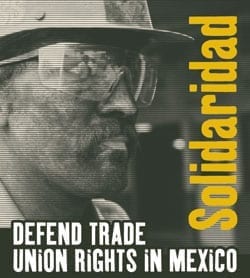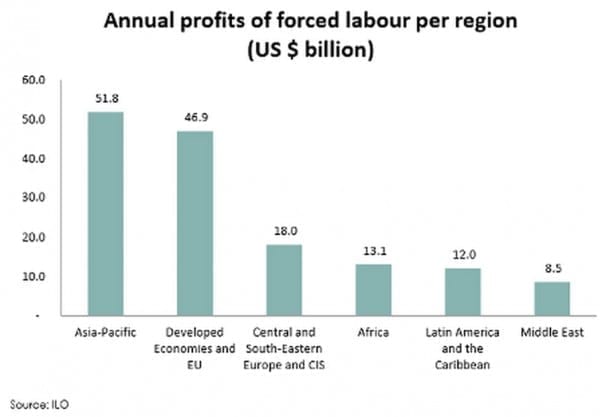Jun 3, 2014
One year after the General Autonomous Confederation for Algerian Workers (Confédération Générale Autonome des Travailleurs Algériens, CGATA), submitted a registration application to the government, the national federation of autonomous unions still is waiting for its application to be confirmed. According to Algerian law, CGATA should have been granted full legal status within 30 days.
The International Union of Food, Agricultural, Hotel, Restaurant, Catering, Tobacco and Allied Workers’ Associations (IUF) is campaigning in support of CGATA and calling for activists around the world to send a message to the Algerian Labor Minister and other government officials: Register CGATA without delay and stop violating the human rights of Algerian workers. The message is in French, followed by English.
“Workers in Algeria are stymied at every turn when they try to form independent unions and act collectively,” according to a recent Human Rights Watch report. “The government punishes peaceful protesters and strikers, including with retaliatory suspensions or dismissals from public service jobs, and arbitrarily arrests and prosecutes union activists on politically motivated charges.”
Take action now.
Jun 2, 2014
 Worker rights advocates have lots of tools available to them to help foster safe and healthy workplaces, family-supporting wages and social protections. One item in the toolbox is rule of law—and a recent Solidarity Center analysis of Mexican laws and policies through the lens of a key international standard offers an example of how to utilize legal instruments to make positive change.
Worker rights advocates have lots of tools available to them to help foster safe and healthy workplaces, family-supporting wages and social protections. One item in the toolbox is rule of law—and a recent Solidarity Center analysis of Mexican laws and policies through the lens of a key international standard offers an example of how to utilize legal instruments to make positive change.
The Solidarity Center examined Mexico’s Constitution, federal law, public policies and common law (court rulings) and compared them with the obligations the country agreed to in 1981 when it ratified the International Covenant on Economic, Social and Cultural Rights (ICESCR).
Adopted by the United Nations in 1966 and in force since 1976, the ICESCR is a binding document signed by nearly all (162) countries. The IESCR covers issues such as forced labor, child labor, gender, migration and obligations to combat and reduce unemployment. It also includes extensive rights around freedom of association and the right to strike. The Solidarity Center compared three ICESCR articles with Mexico’s laws and conducted interviews and research to determine the extent of the country’s compliance. (The report will be out this summer—watch the Solidarity Center website for its release.)
Among the findings:
• Mexico’s 2012 labor law reform, in line with its ICESCR obligation to put in place a national employment plan and reduce the number of workers forced to make a living in the informal economy, has not fulfilled its goal of increasing jobs in the formal economy nor reducing informal-sector employment and overall employment.
• Laws in Mexico do not effectively limit the hours domestic workers can legally labor as part of its ICESCR obligation to protect the country’s 2.3 million domestic workers. Rather, the laws establish the possibility of a 12-hour day with no right to overtime pay, a violation of the country’s international obligations.
• Mexico’s labor law includes provisions to improve job safety and health, in accordance with the ICESCR, but many problems remain. For instance, new mining regulations cover coal but not other forms of mining, and attempt to regulate, but do not outlaw, artisanal mining, where many fatalities occur. The Labor Ministry, with one of the smallest shares of the federal budget, has limited resources for workplace inspections and even for the proper training of inspectors.
Such an analysis provides a concrete springboard from which unions and other worker advocates can pursue worker rights. Countries that ratify the ICESCR are obliged to report on the extent of their compliance, which includes enforcement, not merely implementation, of their ICESCR obligations. As a binding document, the ICESCR provides worker advocates a legal tool for pursuing fundamental socioeconomic rights based in international human rights norms.
Last year, the ICESCR Optional Protocol went into effect, giving individuals in countries that ratify the protocol the ability to seek justice for violations of their economic, social and cultural rights. Fourteen countries have ratified the optional protocol, including El Salvador, Gabon, Mongolia and Uruguay. The Optional Protocol can provide a key mechanism for improving worker rights, and unions and other civil society groups are well placed to advocate for its passage.
As part of the UN’s Bill of Human Rights, the ICESCR points to economic rights as essential to the fulfillment of human potential. As former South African President Nelson Mandela stated: “There is at times a tendency to view civil liberties as distinct from socioeconomic rights….There can be no more forceful refutation of that false distinction than the manner in which President Roosevelt formulated the generic freedoms of democracy
May 29, 2014
Several workers in Tangiers, Morocco, were beaten as they protested the firing of union leaders at a packing factory in recent days. One worker lost four teeth and, along with one other man, required hospitalization. A video documents the aftermath of the attack, during which a worker lay bleeding on the ground.
After workers established a union affiliated with the Moroccan Labor Union (Union Maroccaine du Travail, UMT) at the industrial packaging plant in the Gaznaya free-trade zone in Tangiers, management fired the union leaders. Union leaders say they believe the men who attacked the protesters were hired by the employer. Workers say the poor working conditions at the manufacturing plant led them to form a union.
In February, five workers were fired from their jobs at a call center in Casablanca, Morocco, after they formed a union.
May 28, 2014
More than a dozen garment factory union leaders in Gazipur, Bangladesh, have been physically attacked or threatened with violence and even death in the past two weeks, according to the Bangladesh Independent Garment Workers Union Federation (BIGUF).
The attacks are centered on garment workers seeking to form unions at factories owned by East West Industrial Park, which operates 11 factories in a large manufacturing complex outside Dhaka, the capital. More than 15 garment union leaders, fearing for their safety, have left their homes and cannot return to work.
BIGUF leaders say they have met with East West managers, who indicated they would provide for a police presence outside the factory gates where many of the attacks have occurred, but so far, have not.
Garment workers at five East West factories began forming unions in March and sought to register their unions with the government.
The government has rejected all the applications, based on flimsy reasons such as the absence of a workers’ mother’s name, BIGUF leaders say. Last year, following the April 2013 collapse of Rana Plaza, which killed more than 1,110 garment workers, the Bangladesh government began registering new unions, with more than 130 gaining legal recognition in the last year. But union leaders fear the recent rejections signal a change in course.
After the garment workers filed for registration for their unions, which are affiliated with BIGUF, East West management attempted to form company unions. Each factory-level union sent a letter expressing concerns about management’s actions to the Bangladesh labor director, and BIGUF tried to file an official complaint with police, who refused to accept the report.
Despite garment workers’ success in establishing their own unions in the past year, workers and union organizers also have been harassed, threatened and some physically attacked when trying to exercise their rights to be paid what they are owed and to work in safer workplaces. But the scale of attacks on workers at East West is alarming, union leaders say. BIGUF has documented the attacks, some of which include:
• May 11: An executive committee member of European Pantaloon Fashion Limited Workers’ Union was abducted outside the factory by approximately a dozen men, who warned him against continuing his trade union activities.
• May 12: Two executive committee members of Pantaloon Fashion Limited Workers’ Union were abducted outside the factory at gunpoint, beaten and robbed. Workers identified the men as associated with the factory.
• May 20: Two supervisors from East West Fashion Garments Limited appeared at the union general secretary’s home and abducted him, taking him to an East West contractor’s office, where he was told that he would be killed if he continued his union activism.
• May 24: A union executive committee member of European Pantaloon Fashion Limited Workers’ Union was beaten outside his home by a group of unidentified men.
BIGUF is demanding an immediate end to violence and intimidation of workers and organizers at factories in the East West complex. BIGUF also is calling on management to hold the perpetrators of violence accountable; ensure the safety of union leaders, members and organizers, as well as their family members; guarantee the safety of union leaders so they can return to work; and recognize and negotiate with the unions at its factories.
May 21, 2014

Some 21 million women, men and children are in forced labor, trafficked, held in debt bondage or work in slave-like conditions worldwide, and their toil generates an estimated $150 billion in illegal profits in the private global economy, according to a new report by the International Labor Organization (ILO). The $150 billion in illegal profits is three times more than the previous ILO estimate.
he majority of those in forced labor are women and girls, who make up 55 percent of the total, compared with 9.5 million (45 percent) men and boys. Many of these women are domestic workers. Of the 52.6 million domestic workers worldwide, the report estimates 3.4 million—6.5 percent—are in forced labor. Further, many domestic workers are migrants, often exploited by labor brokers and employers. The report notes that an estimated $8 billion is literally stolen annually from domestic workers in forced labor who, on average, are effectively deprived of 60 percent of their wages.
Overall, $51 billion of the estimated $150 billion in illegal profits results from forced economic exploitation, including domestic work and agriculture, areas where women make up much or most of the workforce. Commercial sexual exploitation accounts for $99 billion.
“Profits and Poverty: The Economics of Forced Labor” finds solid evidence for a correlation between forced labor and poverty. In countries where the ILO measured “income shocks” and food insecurity, such as Niger and Bolivia, a larger percentage of forced laborers than people who worked freely came from households where income had declined. In Nepal, only 9 percent of workers in forced labor had lived in food-secure households, compared with 56 percent of freely employed individuals.
The report finds the profit from forced labor is generated from three broad areas:
• $34 billion in construction, manufacturing, mining and utilities.
• $9 billion in agriculture, including forestry and fishing.
• $8 billion saved by private households by not paying or underpaying domestic workers held in forced labor.
An individual is considered to be working in forced labor, according to the ILO’s survey guidelines, if his or her recruitment was not free and involved some form of penalty at the time of recruitment, and if that individual works and lives under duress, and faces any penalty or cannot leave the employer because of the menace of a penalty.
• Read a summary of the report.
• Read the full report.
• In this video, ILO Director General Guy Ryder urges immediate action to end forced labor.


